
-

Ep. 01 | Advocacy, Equity, and the Future of Gifted Ed: A Conversation with Dr. Jennifer Lemoine
Dr. Meryl chats with Dr. Jennifer Lemoine about her journey from classroom teacher to district leader in gifted education. They discuss her advocacy for twice-exceptional and economically disadvantaged students, her doctoral research on family experiences in gifted programs, and the systemic shifts needed to create more equitable opportunities for all learners.
Check out Dr. Lemoine’s dissertation here: Perceptions and Practices of Families with Economic Disadvantages Regarding Giftedness and Family Involvement -
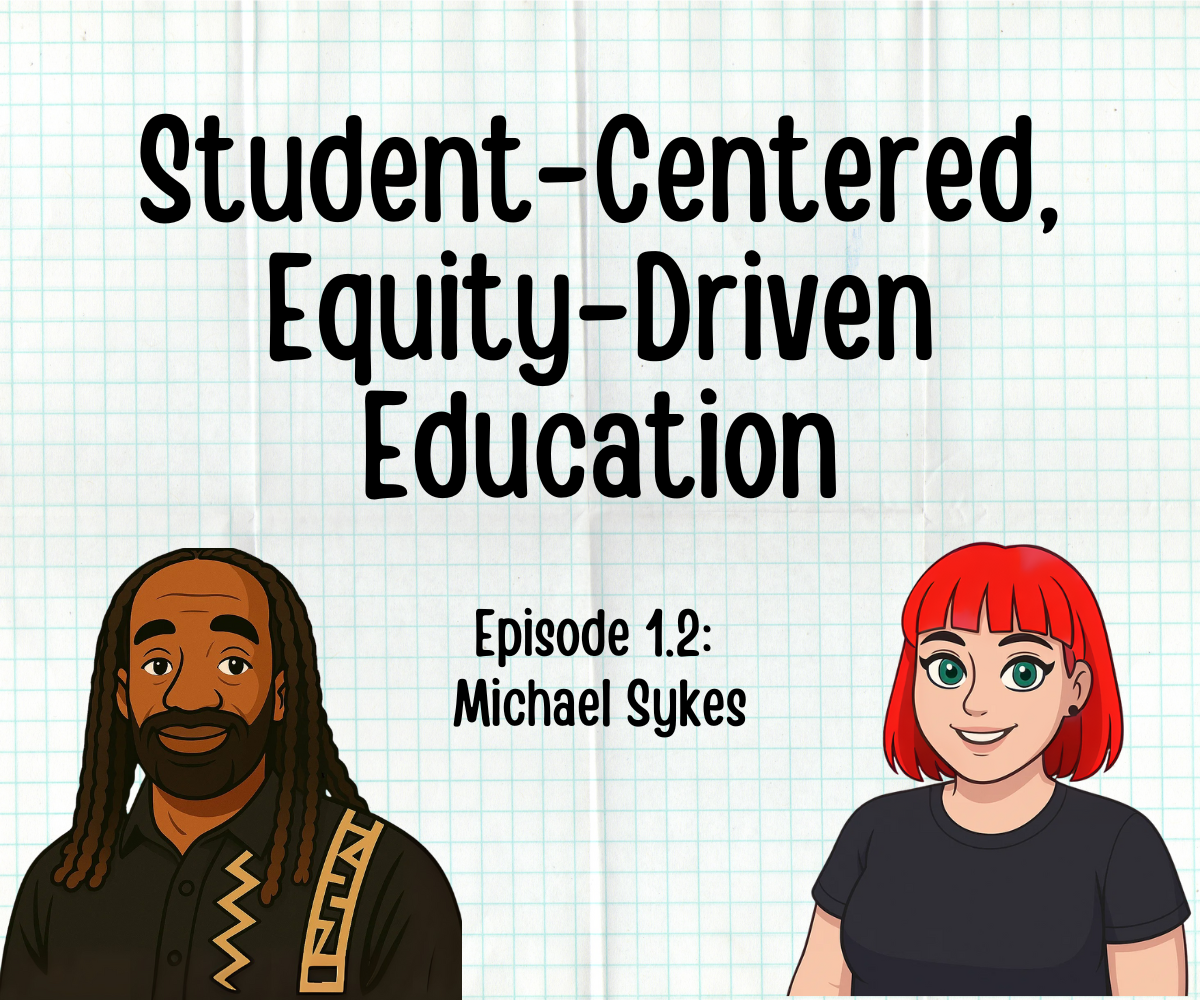
Ep. 02 | Student-Centered, Equity-Driven: Michael Sykes on Reimagining Education
Dr. Meryl talks with educator and equity advocate Michael Sykes about supporting exceptional learners through empathy, advocacy, and student-centered practices. They explore special and gifted education, navigating IEPs, and the message behind Michael’s book Easy Equity: that self-love and accountability are the roots of lasting change in education.
Follow Michael on Instagram @equitablesolutionscolorado and check out his website for more information on his book and services: https://equitablesolutions.net/ -
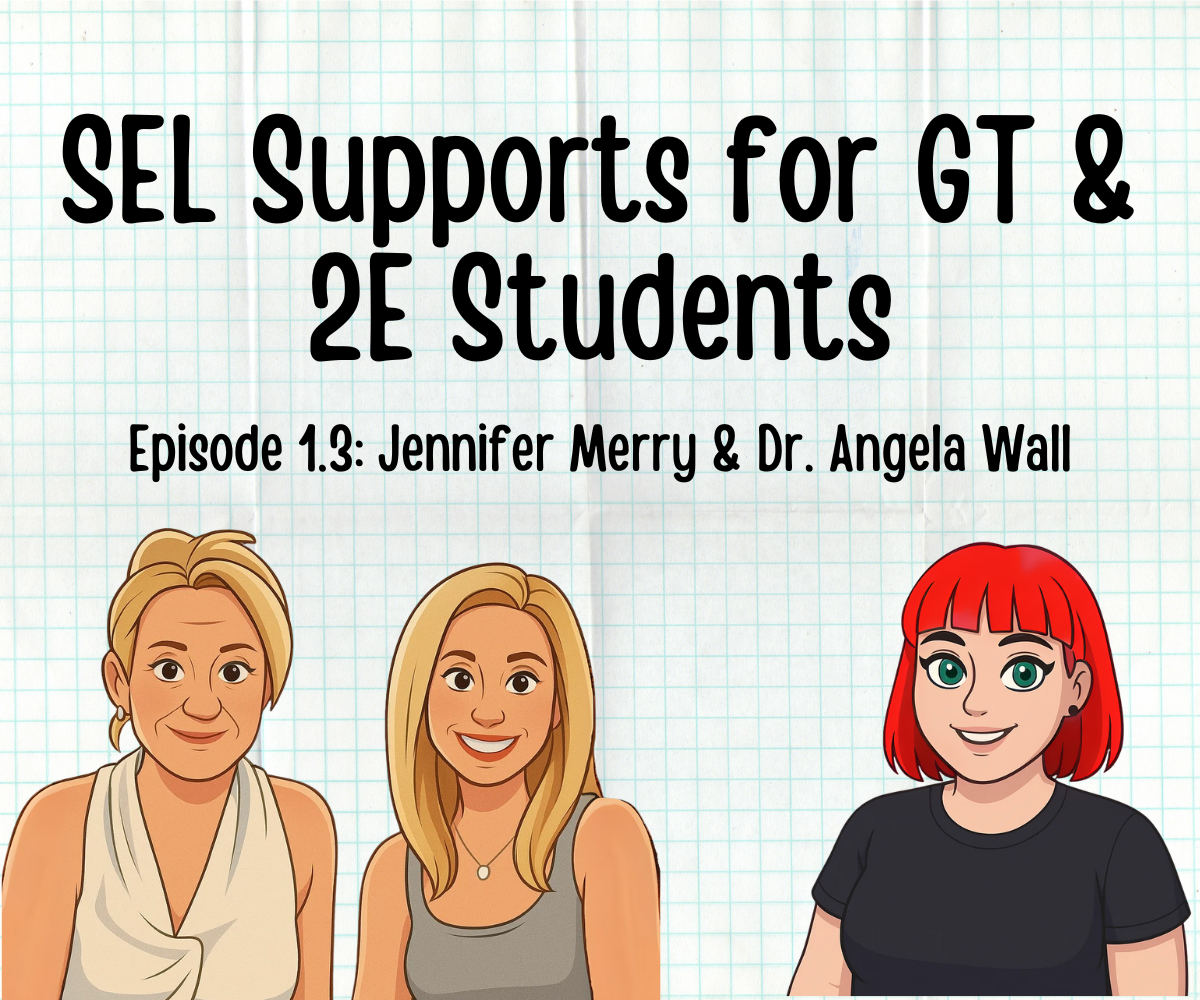
Ep. 03 | Supporting the Emotional Needs of Gifted and 2E Students: Jennifer Merry + Dr. Angela Wall
Dr. Meryl is joined by psychologists Jennifer Merry and Dr. Angela Wall for a meaningful conversation on the emotional lives of gifted and twice-exceptional (2e) students. They dive into the importance of social emotional learning (SEL), explore the impact of masking and perfectionism, and discuss how risk-taking, justice sensitivity, and advocacy play powerful roles in supporting gifted learners. With insights for both educators and parents, this episode offers encouragement and practical strategies for creating emotionally safe, student-centered learning environments.
Check our Jennifer’s psychology practice supporting Gifted and Talented children at jennifermerry.com
-
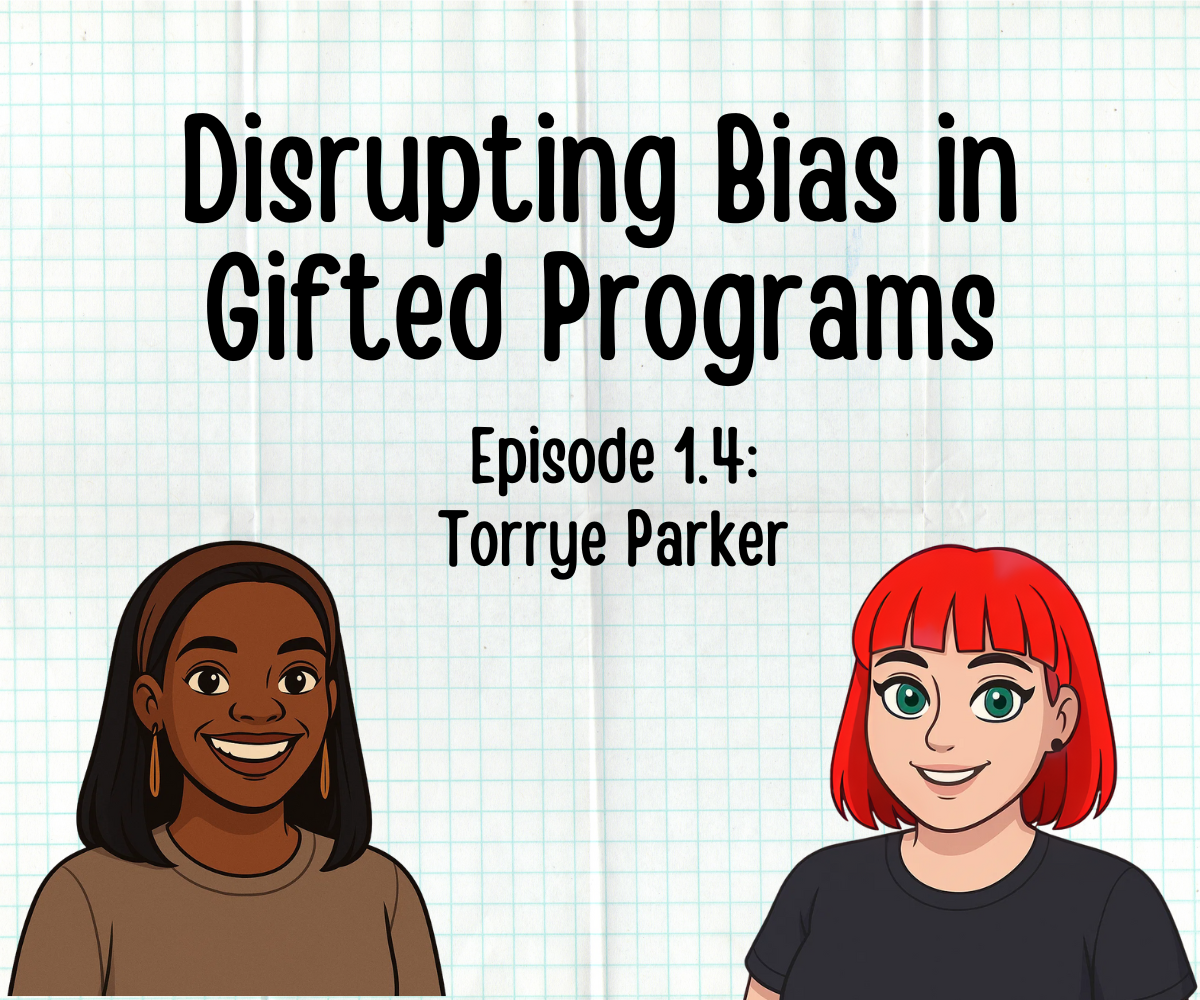
Ep. 04 | Disrupting Bias in Gifted Programs: Torrye Parker
Dr. Meryl sits down with educator, consultant, and educational equity advocate Torrye Parker for a powerful conversation on how race, neurodiversity, and systemic bias intersect in gifted education.
As the founder of Reimagine Consulting Group, Torrye partners with organizations to improve operations, stakeholder engagement, and leadership capacity, ensuring they have the tools to create lasting impact. Grounded in a deep commitment to equity and culturally responsive leadership, she works with organizations to build systems that are inclusive, sustainable, and reflective of the communities they serve. -
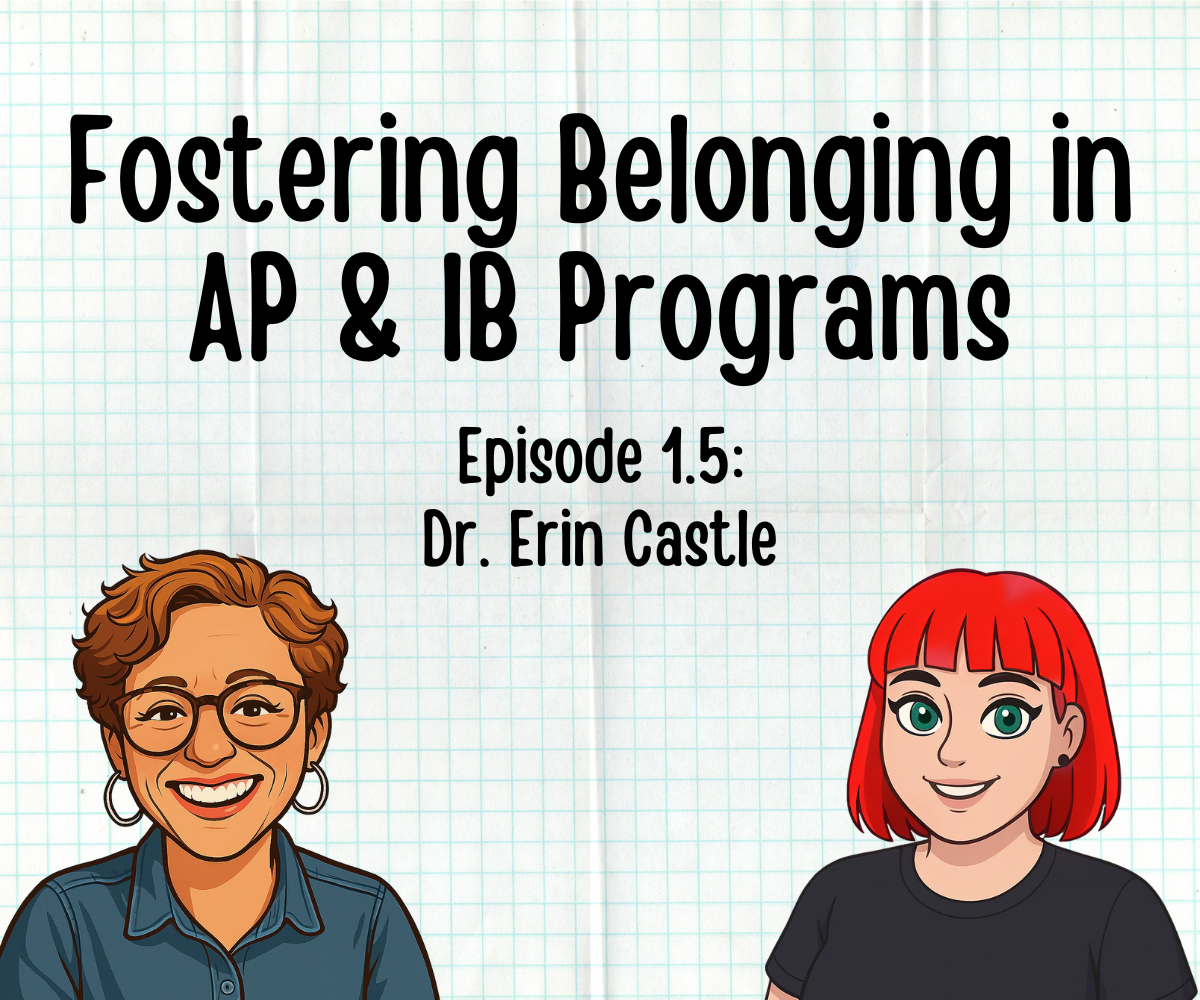
Ep. 05 | Fostering Belonging in AP and IB Programs: Dr. Erin Castle
Dr. Meryl reconnects with fellow educator, Dr. Erin Castle, for a meaningful conversation about belonging in advanced academic spaces like AP and IB programs.
Dr. Castle shares her journey from working on a presidential campaign to entering the complex world of public education. With 15 years of experience as a teacher and coordinator in advanced academics—and a doctorate focused on belonging in high school advanced courses—she brings powerful insights into the barriers students of color and twice-exceptional learners still face.
-
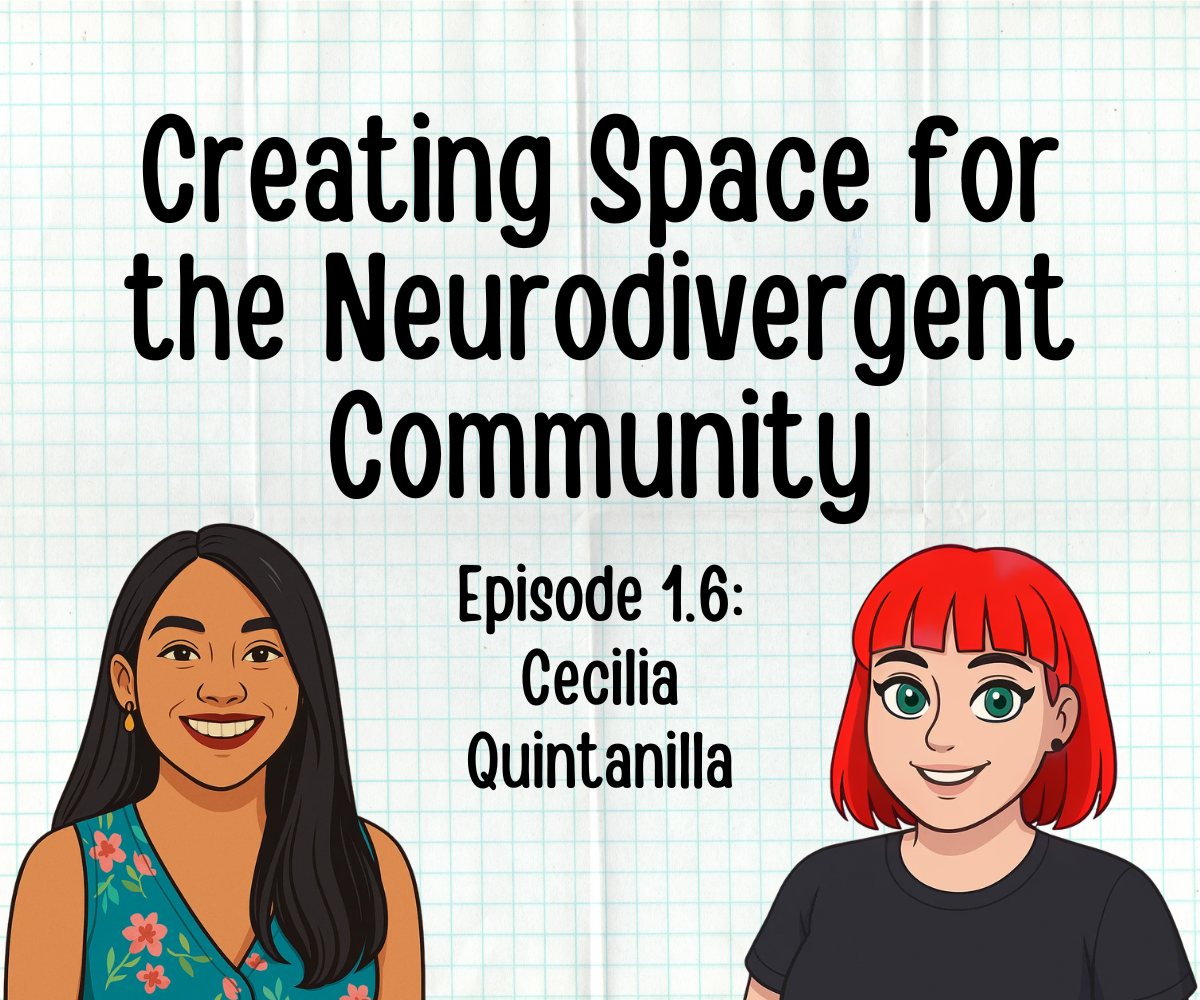
Ep. 06 | Creating Space for the Neurodivergent Community: Cecilia Quintanilla
Dr. Meryl chats with Cecilia Quintanilla, a Bolivian-born educator, musician, and nonprofit founder whose journey into gifted advocacy is both personal and powerful.
Cecilia shares her story of navigating two educational systems—as a student in Bolivia and as a parent and educator in the United States. Inspired by her own late-in-life neurodivergence discovery and her children’s experiences in school, she founded YB Neuro, a nonprofit focused on supporting neurodivergent families with compassion, creativity, and community.
YBNeuro is a nonprofit inspired by the Andean concept of yachay; wisdom of the mind, heart, hands, and land. We create spaces where neurodivergent individuals and their families feel seen, supported, and empowered. After five successful cycles in Spanish, we’re excited to launch our first free workshops and discussion groups in English. If you’re a neurodivergent adult, parent, or professional looking for community and connection, reach out to cecilia@ybneuro.org or visit www.ybneuro.org
-
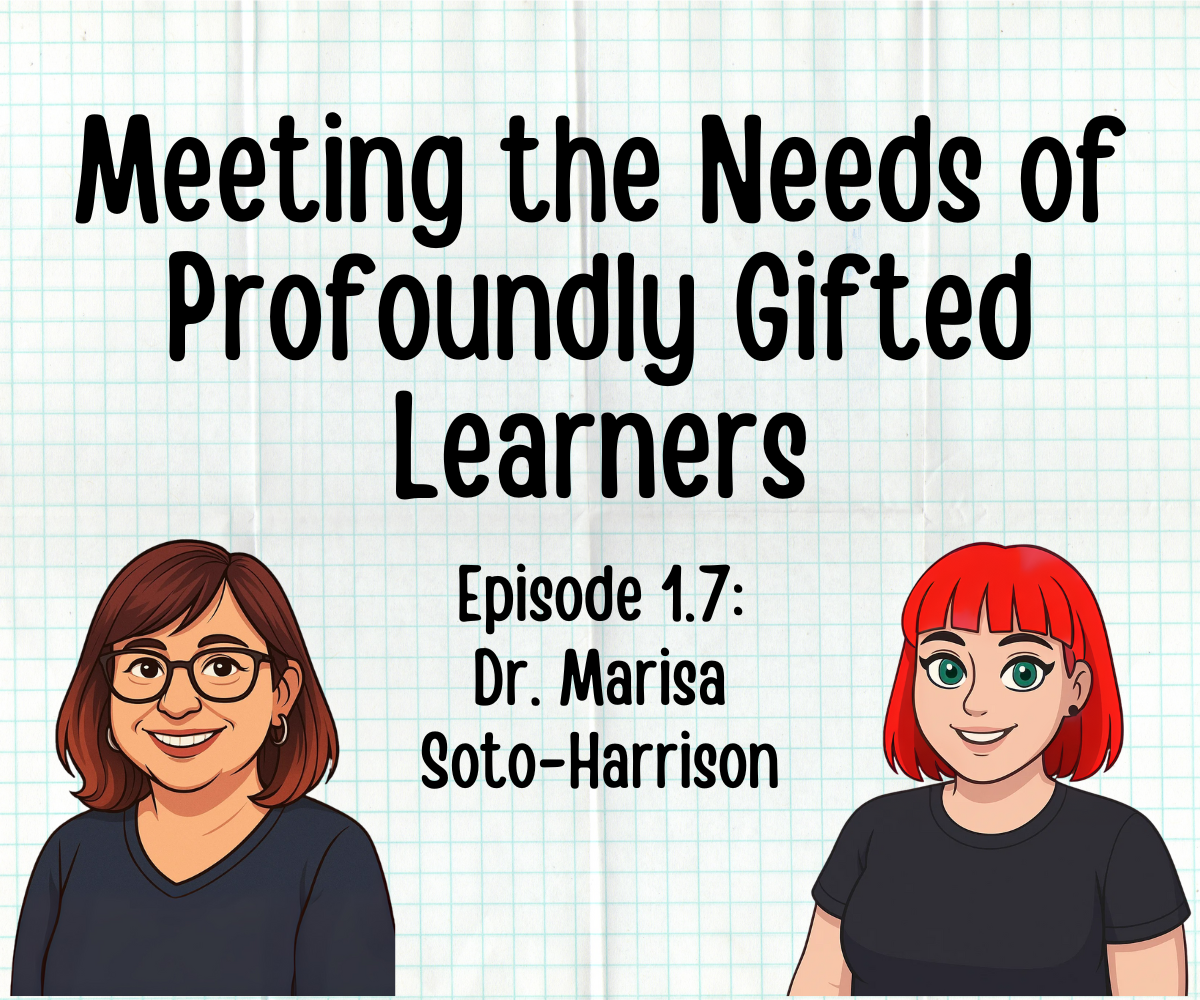
Ep. 07 | Meeting the Needs of Profoundly Gifted Learners: Dr. Marisa Soto-Harrison
Dr. Meryl talks with Dr. Marisa Soto-Harrison, a dedicated educator, researcher, and parent whose work centers on supporting profoundly gifted and twice-exceptional students. With more than two decades of experience in gifted education, Marisa shares how her journey began with her own children and evolved into a mission to better understand the academic and emotional needs of gifted learners.
Marisa also shares her next exciting step: the creation of Sierra Gifted Environmental School, an online program designed specifically for gifted, creative, and twice-exceptional learners. Her vision is clear—create an education that actually works for them.
Check out Dr. Soto-Harrison’s dissertation here: Underachieving Profoundly Gifted Adolescents -

Ep. 08 | Teaching Emotional Resilience: Simon Wilson
Dr. Meryl sits down with Simon Wilson—a special education teacher, school counselor, life coach, and mental health advocate—to talk about the connection between emotional well-being and student success.
Simon shares his powerful personal story of navigating childhood anxiety and school struggles, and how those early experiences shaped his path as an educator and father. Together, they explore the emotional needs of children—especially those in gifted and special education settings—and how empathy, open communication, and self-understanding can foster emotional resilience.
Simon also introduces Learning to Love Your Monster, a heartfelt children’s book he co-authored with his partner to help kids better understand their emotions. The conversation highlights how emotional support, both at home and in school, can transform the learning experience for all children.
-
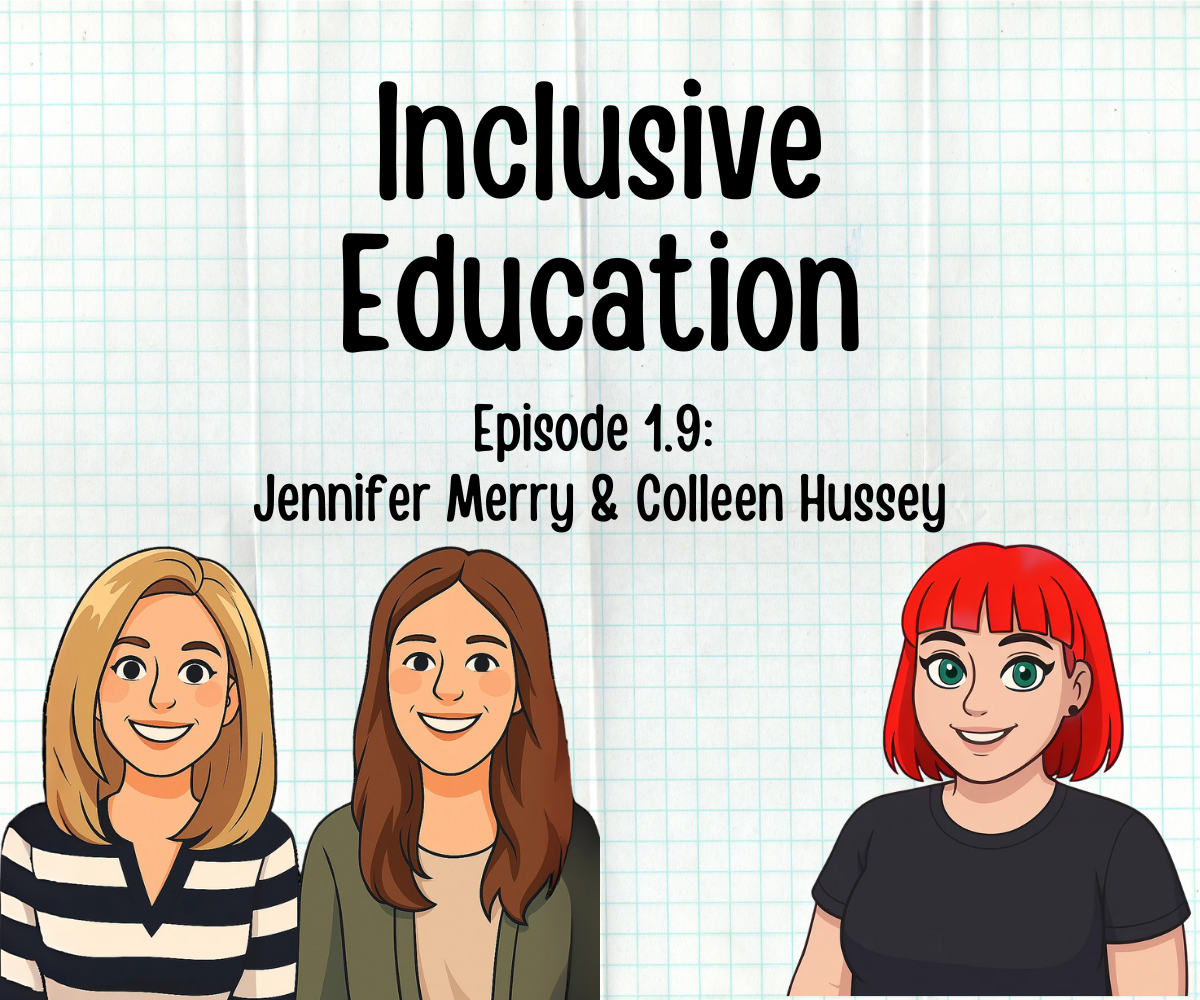
Ep. 09 | Inclusive Education: Jennifer Merry and Colleen Hussey
Dr. Meryl chats with Jennifer Merry and Colleen Hussey—two seasoned educators and fierce advocates for inclusive education—to explore how inclusive practices can transform school communities and better support exceptional learners.
Jen, a nationally certified school psychologist, and Colleen, a special education expert and nonprofit cofounder, share their deep experience working across educational systems to ensure that all students—especially exceptional learners—can thrive in general education settings. They discuss mindset shifts, collaborative teaching models, and how inclusive education isn’t just possible—it’s powerful.
Check out Colleen’s non profits:
Hope for Healing
The Inclusion Project (site coming soon)
Check our Jennifer’s psychology practice supporting Gifted and Talented children at jennifermerry.com
-
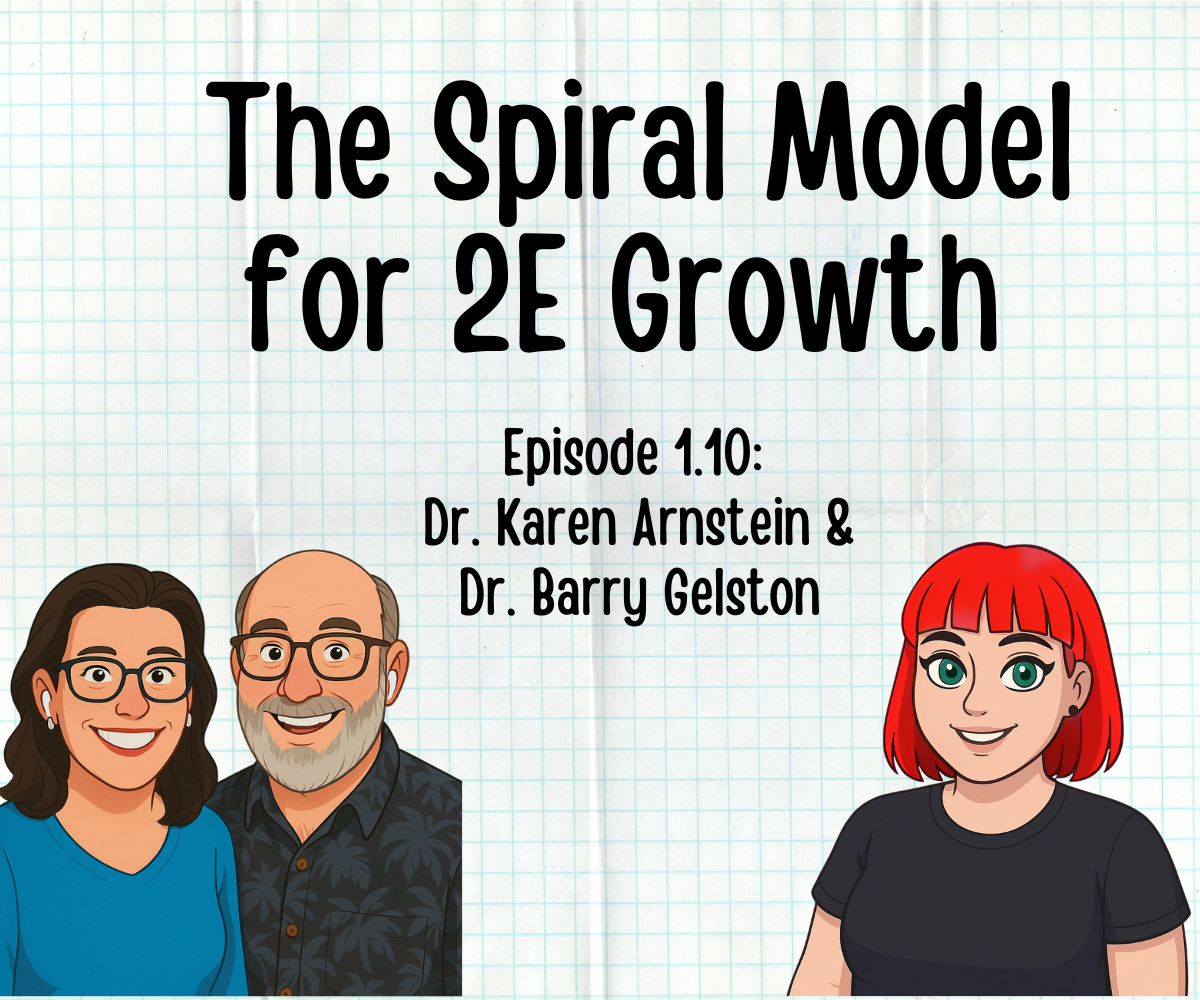
Ep. 10 | The Spiral Model for Twice-Exceptional Growth: Dr. Karen Arnstein & Dr. Barry Gelston
Dr. Meryl dives into discussion with Dr. Karen Arnstein and Dr. Barry Gelston—educators, researchers, and champions for twice-exceptional (2e) learners—to explore how the Spiral Adaptation Lens can transform the way we support exceptional children.
Karen, a postdoctoral researcher at Purdue and core faculty at Bridges Graduate School, and Barry, founder of NeuroD Is Me™ and Mr. Gelston’s One Room Schoolhouse, bring their combined expertise to unpack their Spiral Adaptation Lens. Together, they offer a new way to understand growth—not as a straight line, but as a recursive, dynamic process shaped by challenge, reflection, and reintegration.
Dr. Arnstein’s dissertation: How Parents, Teachers, Psychologists, and Educational Environments Influence Developmental Transitions of Preadolescent Twice-Exceptional Students
Dr. Gelston’s dissertation: Grinding the 2e Lens: Flipping the Paradigm to Adaptive ConnectionCheck out their work and writing at spiralwe.substack.com
-

Ep. 11 | Rethinking High School Gifted Education: Dr. Ryan McClintock
In this episode, Dr. Meryl sits down with gifted educator and advocate Dr. Ryan McClintock to explore his unconventional journey into teaching—and how it’s shaped his bold vision for high school gifted education. Together, they take a fresh look at what’s working, what needs to change, and how we can better support gifted and twice-exceptional teens. From student voice and Advanced Learning Plans to technology, differentiation, and teacher mindset, this conversation is packed with insights for parents, educators, and advocates alike.
Check out Dr. McClintock’s dissertation here: Nurturing Excellence: A Case Study of High School Learning Environments for the Gifted -

Ep. 12 | GiftedCrit: Confronting Race and Reimagining Gifted Education: Dr. Robin Greene
In this episode, Dr. Meryl talks with colleague and friend Dr. Robin Greene—an internationally recognized scholar, lifelong educator, and pioneer of GiftedCrit, the framework she introduced in 2017 dissertation to examine how race and racism are embedded in gifted education. Robin shares her journey from classroom teacher to national leader, offering powerful insights on cultural competency, teacher mindsets, and the bold changes needed to make gifted programs more inclusive.
She is the co-author of Leading Culturally Responsive Gifted Programs: A Roadmap for Changeand Supporting Gifted ELLs in the Latinx Community: Practical Strategies K-12
You can also find her dissertation here: Gifted Culturally Linguistically Diverse Learners: A School-Based Exploration
-
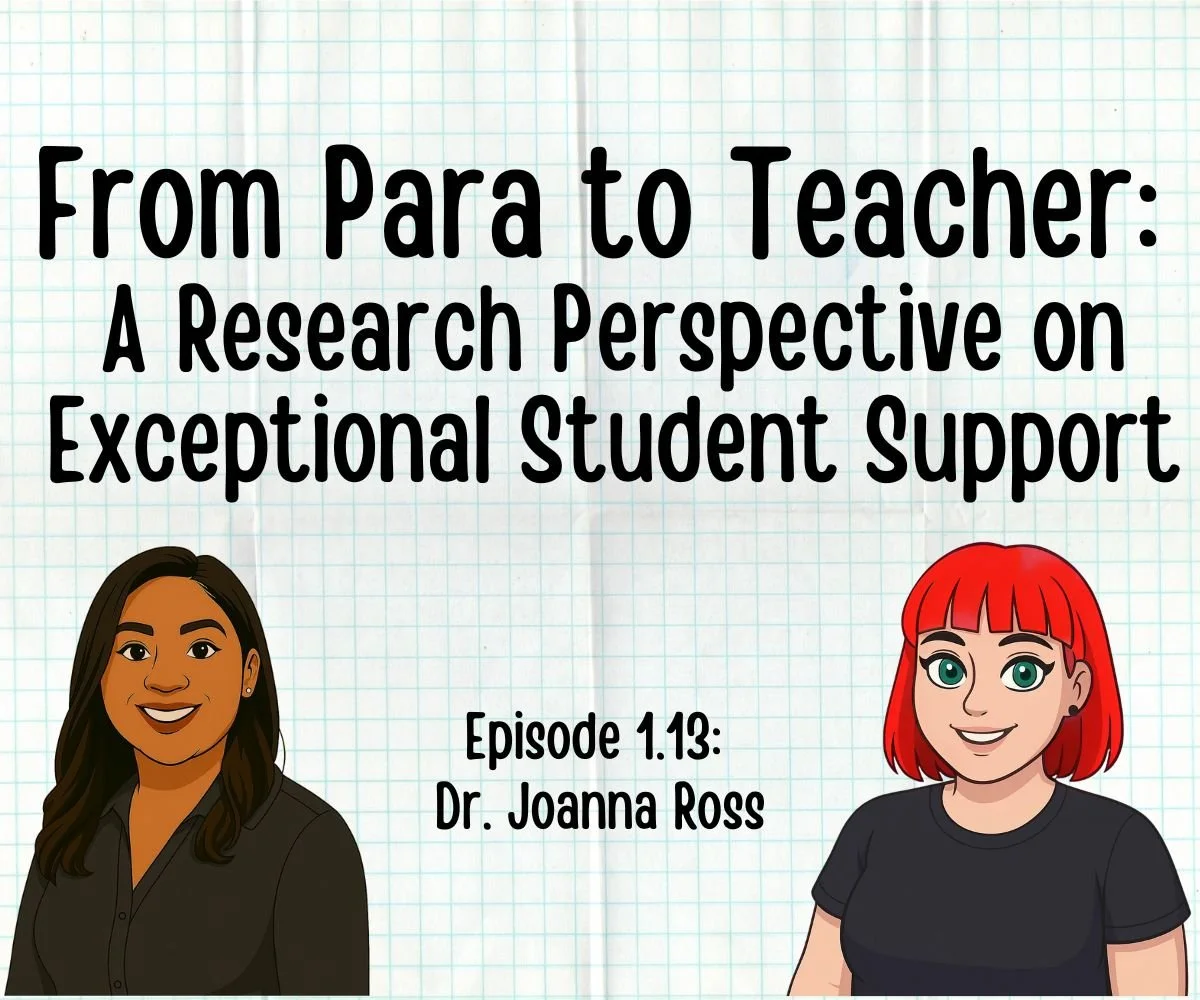
Ep. 13 | From Para to Teacher: A Research Perspective on Exceptional Student Support - Dr. Joanna Ross
In this episode, Dr. Meryl welcomes Dr. Joanna Ross—Gifted and Talented Curriculum Specialist in Denver Public Schools and former Assistant Director of the Center for Urban Education at UNC. With 15 years of experience and newly completed doctoral research, Dr. Ross shares insights into the paraprofessional-to-teacher pipeline and its impact on exceptional students.
Together, they explore the barriers nontraditional college students face, the importance of culturally responsive pedagogy, and how supporting paraprofessionals on their path to teaching strengthens classrooms and creates more inclusive learning environments.
Check out Dr. Ross’ dissertation: The Paraprofessional-to-Teacher Experience: Moving From the Margins to Front and Center. -
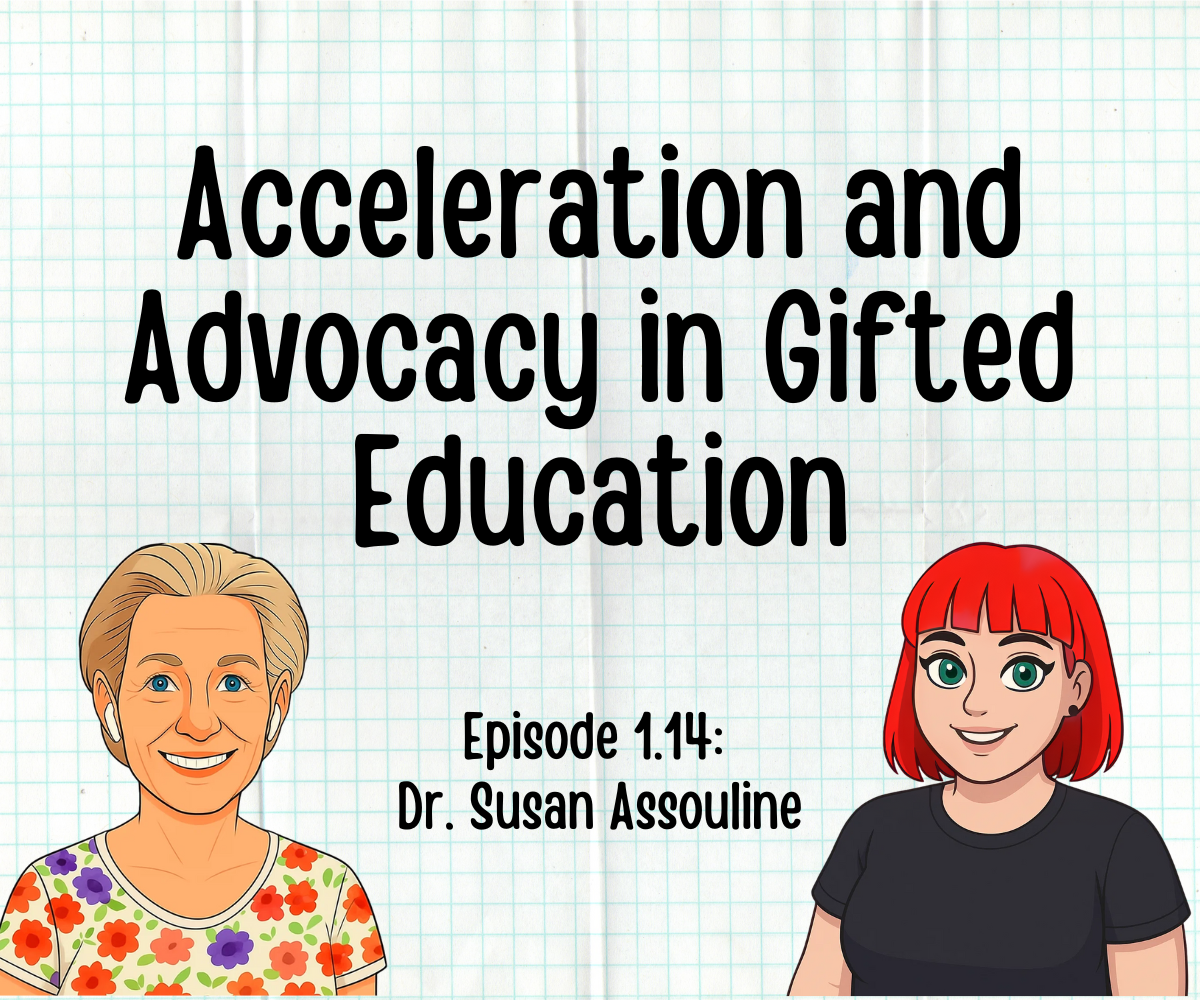
Ep. 14 | Acceleration and Advocacy in Gifted Education: A Conversation with Dr. Susan Assouline
Dr. Meryl speaks with Dr. Susan Assouline—Emeritus Blank Endowed Chair in Gifted Education, a Distinguished Professor of School Psychology, and the Emeritus Director of the Belin-Blank Center for Gifted Education and Talent Development at the University of Iowa—to explore the power of acceleration and advocacy in gifted education.
They explore her journey into gifted education, the creation of the Iowa Acceleration Scale and Integrated Acceleration System, and the landmark reports A Nation Deceived and A Nation Empowered. Dr. Assouline shares research, stories, and advocacy insights that continue to shape how schools approach acceleration for gifted learners.
University of Iowa’s:
- Belin-Blank Center for Gifted Education and Talent Development
- Acceleration Institute
- Advancing 2e ResearchFree PDF Downloads:
A Nation Deceived
A Nation Empowered -
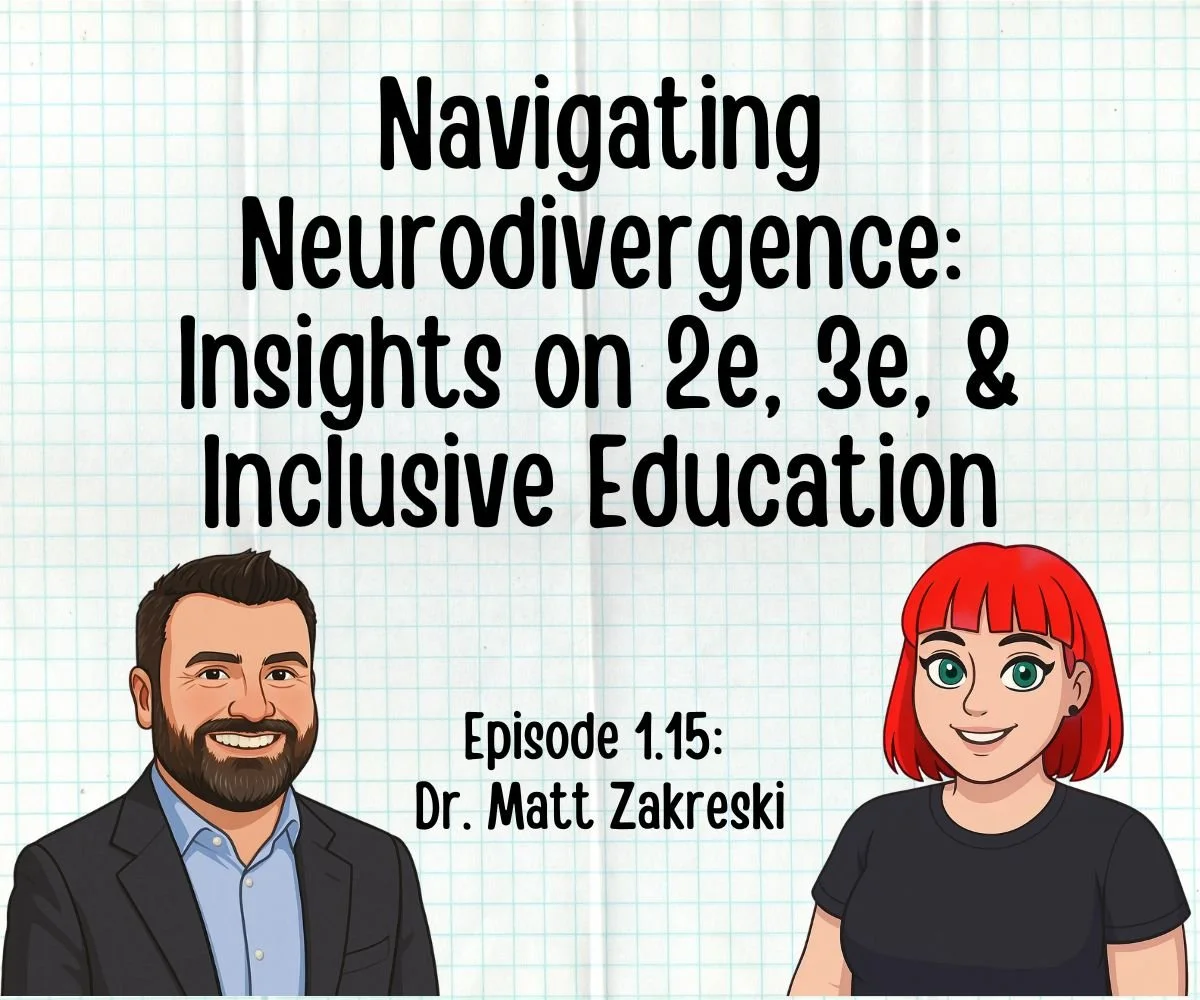
Ep. 15 | Navigating Neurodivergence: Insights on 2e, 3e, & Inclusive Education with Dr. Matt Zakreski
In this episode of Exceptionally Speaking, Dr. Meryl talks with clinical psychologist and speaker Dr. Matt Zakreski—better known as “Dr. Matt”—in an insightful conversation about the many ways neurodivergence shows up in our communities.
Together, they explore Dr. Matt’s own journey as a twice-exceptional student with ADHD, his practical “A, B, and C” framework for understanding the different lived experiences of 2e learners, and what it really means to consider 3e—when giftedness intersects with another exceptionality and a socially relevant identity.
The conversation shines a light on common misconceptions about supporting neurodivergent kids, how schools and families can create more inclusive environments, and why equity must be central in gifted education. Along the way, Dr. Matt shares real-life examples, practical advice, and hopeful perspectives for parents, educators, and advocates alike.
Podcast: Nerding Out on Neurodivergence
Book: Neurodiversity Playbook: How Neurodivergent People Can Crack the Code of Living in a Neurotypical World
Practice: The Neurodiversity Collective
-
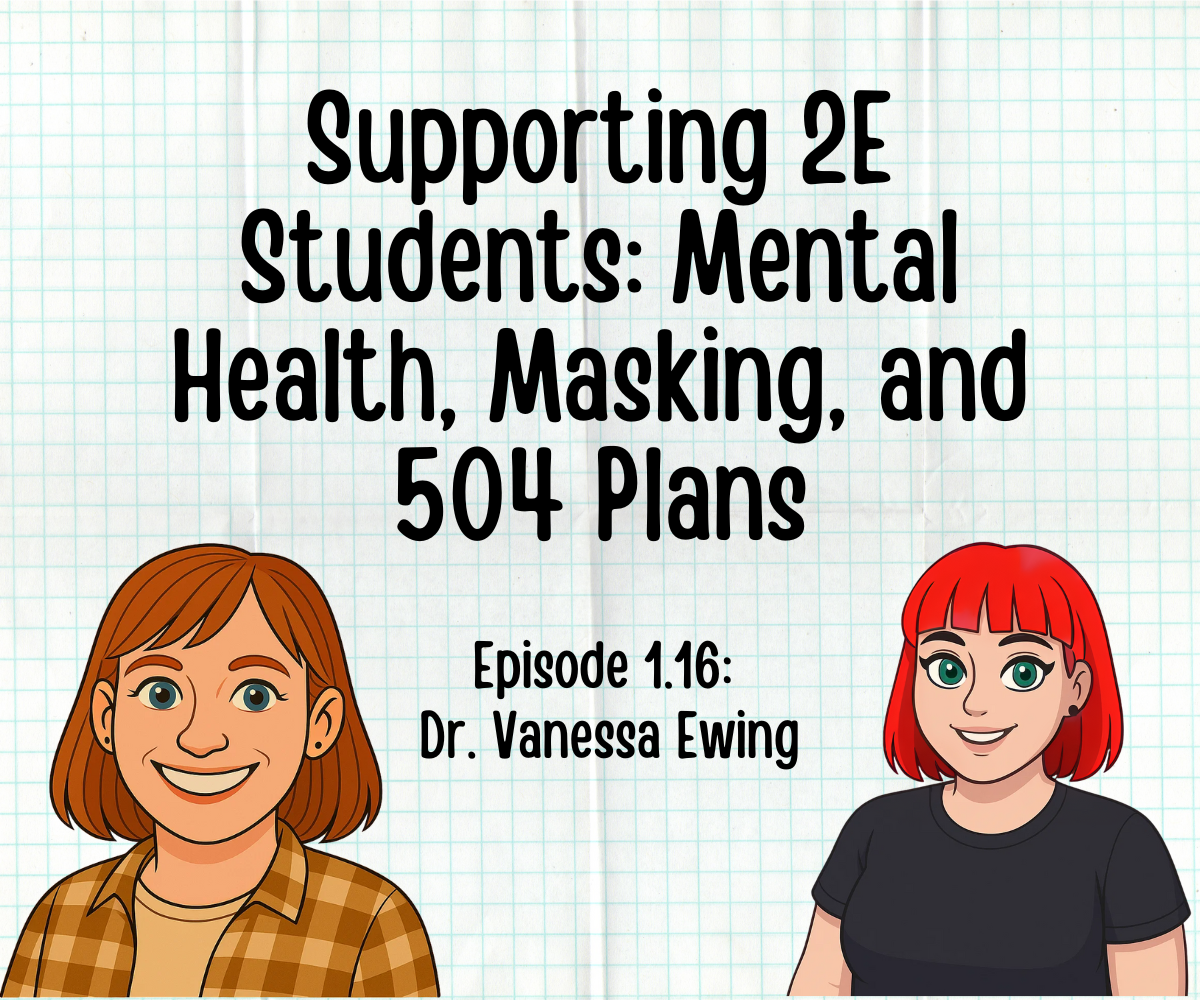
Ep. 16 | Supporting 2E Students: Mental Health, Masking, and 504 Plans with Dr. Vanessa Ewing
Dr. Meryl welcomes Dr. Vanessa Ewing, Ph.D. in Educational Psychology, for a powerful conversation on the intersection of giftedness, twice-exceptionality, and mental health. Drawing from more than 20 years of experience as an educator, coordinator, and school leader, Dr. Ewing shares insights on masking behaviors, navigating 504 plans, supporting teacher well-being, and building relationships that help 2e students thrive. This episode offers both practical strategies and encouragement—reminding families and educators that there is always hope and always another way forward.
Examiner at the Gifted Development Center in Colorado
Assistant Director at Home School Connection -

Ep. 17 | Allyship and Advocacy for Gifted LGBTQIA+ Youth with Jennifer Gottschalk
In this episode of Exceptionally Speaking, Dr. Meryl talks with Jennifer Gottschalk, chair-elect of the NAGC LGBTQ Network, about allyship, advocacy, and creating safe, inclusive spaces for gifted LGBTQIA+ students. Jennifer shares practical classroom strategies, insights on navigating today’s political climate, and hopeful perspectives for educators and families alike.
Resources:
Campus Pride Index
ACLU: LGBTQ Rights
Human Rights Campaign
Kaiser Family Foundation: LGBTQ Health Policy
Movement Advancement Project
GLAAD
National School Redesign Showcase
Slide Decks:
Participant Copy of GT LGBTQ+ GSA NAGC 2024
NAGC 2023 Growing Allyship with Teachers and Parents of Gifted LGBTQIA+ Youth -

Ep. 18 | The Power of Iteration: Rethinking 2E Support Through the Spiral Lens with Dr. Barry Gelston
Dr. Meryl sits down with Dr. Barry Gelston—educator, researcher, and advocate for twice-exceptional (2e) learners—to explore how iteration and the Spiral Lens can reshape the way we see and support exceptional children.
Barry, co-founder of Spiral We, shares how his Spiral Adaptation Lens and the emerging Adaptive Connection Intelligence System (ACIS) reframe behaviors often misread as “defiance” into signals of curiosity and growth. Together, they discuss why outliers aren’t exceptions but prototypes, how strength-based practice transforms classrooms, and why iteration—not perfection—is the real path to learning.
Dr. Gelston’s dissertation: Grinding the 2e Lens: Flipping the Paradigm to Adaptive Connection
Check out Dr. Barry Gelston’s work and writing at spiralwe.substack.com
-

Ep. 19 | Through the Spiral: Understanding Twice-Exceptionality with Dr. Karen Arnstein
Dr. Meryl welcomes Dr. Karen Arnstein, researcher, developmental theorist, and co-founder of Spiral We. She is the originator of the Spiral Model of Development (SMD), which re-conceptualizes twice-exceptionality and neurodiversity through recursive, ecological, and constructivist frameworks. Karen’s scholarship integrates developmental psychology, gifted education, and theories of positive disintegration to offer a fresh lens on asynchrony and adaptive connection. At Spiral We, she guides the conceptual foundations and co-authors the Spiral We Substack and podcast. Her work empowers teachers and practitioners to see complexity as the norm, not the exception, and to design education that affirms both learner and teacher growth.
In this episode, we discuss a fresh way of understanding how gifted and twice-exceptional students grow. Instead of seeing setbacks as failure, her model shows how learning spirals back and builds over time.
We discuss the challenges of funding gifted education, how to recognize hidden potential in students, and what adaptive connection looks like in real classrooms. Dr. Arnstein also shares Spiral We’s new tools—an educator app, community, and courses—designed to give teachers practical, research-based strategies they can use right away.
Dr. Arnstein’s dissertation: How Parents, Teachers, Psychologists, and Educational Environments Influence Developmental Transitions of Preadolescent Twice-Exceptional Students
Check her work and writing at spiralwe.substack.com
-

Ep. 20 | Creating Change from Within: Leading and Learning in Gifted Education with Doug Alexander
This week on Exceptionally Speaking, Dr. Meryl sits down with Doug Alexander—Gifted Education Instructional Specialist in Boulder Valley School District, National Board Certified in Gifted Education, President of the Colorado Association for Gifted & Talented, and Network Chair for the LGBTQ+ Network at the National Association for Gifted Children. Together, they explore what it means to truly see and serve gifted and twice-exceptional learners, the power of student voice, and how meaningful change can grow from inside our schools and communities.
2025 Colorado Association for Gifted and Talented Conference: Empowering Change -

Ep. 21 | The Montessori Model Through a Gifted Lens with Alesandra Rodríguez
In this episode of Exceptionally Speaking, Dr. Meryl talks with Alesandra Rodríguez, a Bilingual Early Childhood Adjunct Professor at Front Range Community College and Mesa State University. With over a decade of experience in Montessori, bilingual, and gifted education, Alesandra brings deep insight into how Montessori classrooms can nurture gifted and twice-exceptional learners.
Together, they explore the Montessori philosophy, differentiation, acceleration, and the unique benefits of bilingual programs for gifted students. Alesandra also shares her work with YBNeuro, a nonprofit supporting neurodivergent students and families, and offers practical advice for educators and parents alike.
-

Ep. 22 | Transforming Gifted Education Through Educator Wellness with Heather Vaughn
Dr. Meryl talks with Heather Vaughn, EdS, Manager in the Gifted and Talented Department at Denver Public Schools. With decades of experience as a teacher, leader, and advocate, Heather shares insights on how educator well-being directly shapes the learning environments we create for gifted and twice-exceptional students.
Together, they explore what authentic wellness looks like in schools today, how leaders can model balance and belonging, and why supporting educators is one of the most powerful ways to transform gifted education.
-

Ep. 23 | From Classroom to Career: Preparing Gifted Learners for What’s Next with Emmaly Perks
Dr. Meryl sits down with gifted education consultant Emmaly Perks, M.Ed., founder of Beyond Gifted Services and author of The CURIOUS Career Workbook: Redesigning Work for Gifted, Creative, and Multi-Talented Minds.
Together, they explore how families can help gifted and twice-exceptional students find the right-fit high school—one that nurtures both their strengths and their well-being. Emmaly shares insights on balancing rigor with socio-emotional support, how Career and Technical Education (CTE) and concurrent enrollment can expand—not limit—future options, and why exploration and mentorship are vital for helping gifted teens transition successfully into adulthood.
This thoughtful conversation shines a light on what it really means to prepare gifted learners for life beyond academics—building purpose, confidence, and connection along the way.
The CURIOUS Career Workbook: Redesigning Work for Gifted, Creative, and Multi-Talented Minds.
-
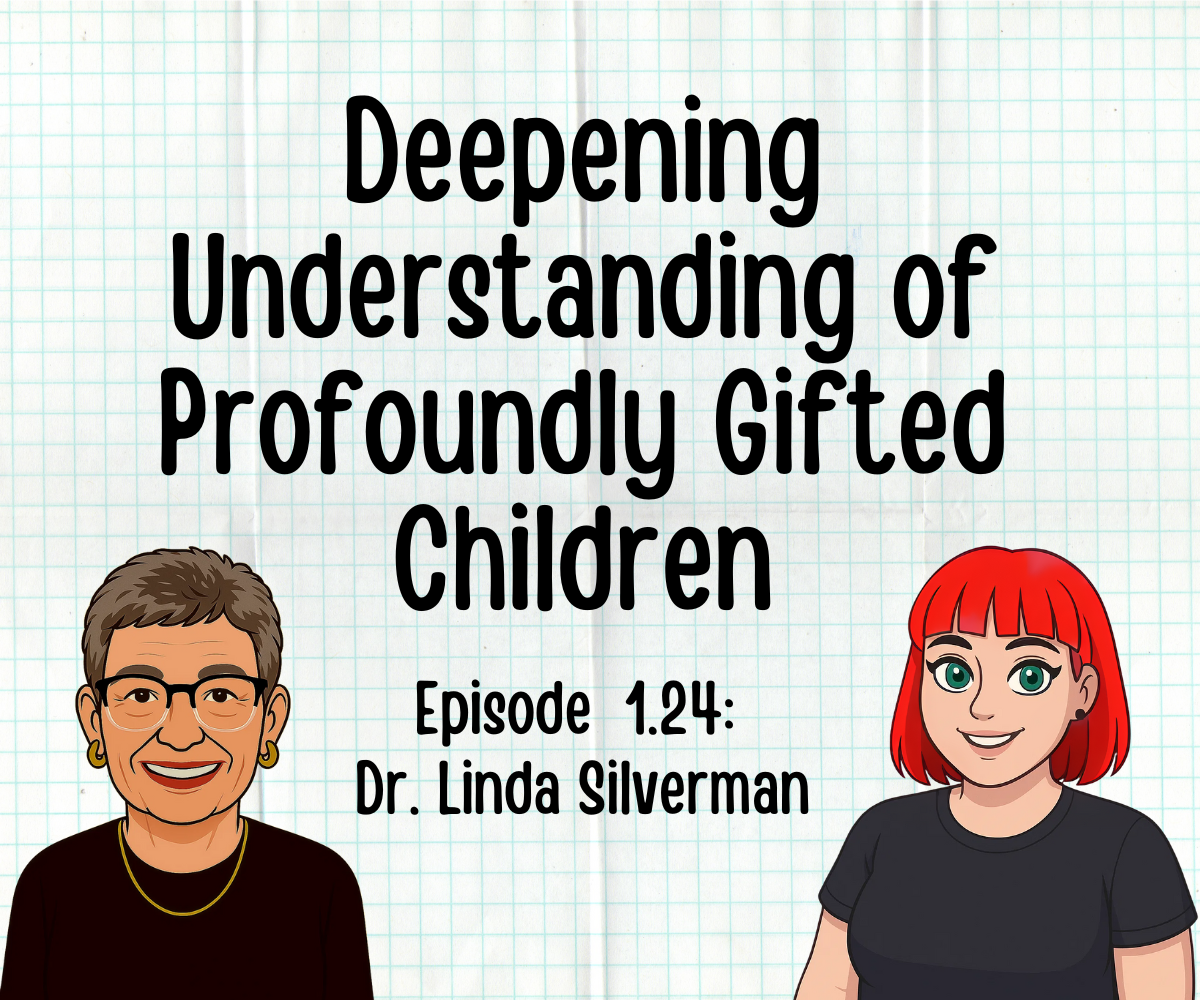
Ep. 24 | with Dr. Linda Silverman
In this episode, I’m joined by Dr. Linda Kreger Silverman, one of the most influential figures in gifted education and psychology. As founder of the Gifted Development Center and a researcher who has studied more than 6,600 gifted children, Dr. Silverman brings unparalleled insight into advanced development, visual-spatial learners, and twice-exceptional students.
Together, we explore the world of profoundly gifted children—how they differ from gifted and highly gifted peers, why a “one-size-fits-all” approach falls short, and what families need to know about asynchrony, mental health, and common misconceptions. Dr. Silverman also shares practical guidance for finding the right educational fit and highlights supportive communities like the Davidson Institute, Epsilon Camp, and PG Retreat.
A powerful and eye-opening conversation for families, educators, and anyone seeking to understand the full spectrum of giftedness.
Gifted Development Center
